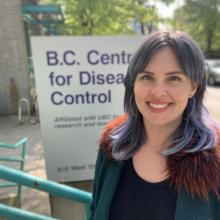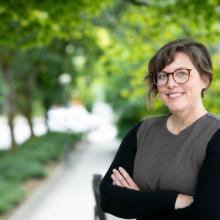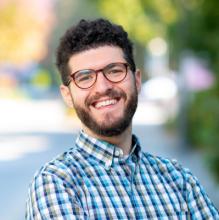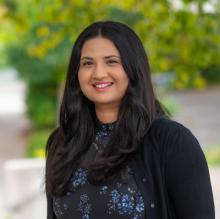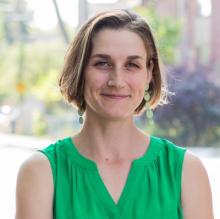Being a public scholar means connecting evidence and knowledge from research and scholarship within academic institutions to create more equitable and just health policy and practice. As a nurse clinician-scientist, being a public scholar means membership in both worlds—academia and clinical practice—to work towards bridging the knowledge- practice gap between scholarship and nursing practice.
Research Description
In 2016, The Government of BC declared a public health emergency due to alarming increases in overdose deaths from the toxic unregulated drug supply. In 2022, we are now six years into an escalating drug poisoning crisis (also called the overdose crisis) with over 10,000 lives lost in BC alone. The unregulated drug supply is unpredictable and volatile, often containing extreme concentrations of fentanyl causing catastrophic deaths from drug poisoning (also called overdose). The toxic drug poisoning crisis impacts people from all walks of life, many of whom access healthcare services that are both related and unrelated to substance use health—from primary care in community to acute care in hospital settings. Yet, healthcare providers often overlook their patients’ health and safety related to substance use. These missed opportunities to provide life-saving harm reduction and overdose prevention and response services—such as access to prescribed safer supply, episodic overdose prevention services, take home naloxone training, safer substance use education, and others—reinforces the risk of harms and death from the toxic drug supply. As the largest group of healthcare professionals providing direct care to people who use substances, nurses are ideally positioned to include harm reduction and overdose prevention and response interventions as part of their routine practice. However, there are many challenges to implement and sustain change in nursing practice which are complicated by pervasive oppression, stigmatization, and criminalization of people who use substances. My doctoral research will identify recommendations to implement harm reduction and overdose prevention and response in nursing practice environments. My research is grounded in critical theoretical perspectives, including intersectional and postcolonial feminism, and complexity theory. My research examines the dynamics and relationships that influence nurses’ behaviour and decision-making in complex practice environments that influence their engagement with harm reduction and overdose prevention and response services. Utilizing a mixed method research methodology, my research includes diverse data sources and a range of perspectives and evidence to better understand the processes and relationships influencing engagement with harm reduction and overdose prevention and response as nursing practice. In my role as the Senior Practice Lead of Harm Reduction and the Unregulated Drug Poisoning Crisis Response at the BC Centre for Disease Control, my research will inform provincial public health policy and practice recommendations to improve equitable access to harm reduction and overdose prevention and response services for people who are at risk of drug poisoning across BC.
What does being a Public Scholar mean to you?
To me, being a public scholar means connecting evidence and knowledge from research and scholarship within academic institutions to create more equitable and just health policy and practice. As a nurse clinician-scientist, being a public scholar means membership in both worlds—academia and clinical practice—to work towards bridging the knowledge- practice gap between scholarship and nursing practice.
In what ways do you think the PhD experience can be re-imagined with the Public Scholars Initiative?
The public scholars initiative highlights the transferable skillset through PhD education and diverse opportunities available to people with doctoral education. The initiative recognizes that academia is one option among many and provides support to pursue less explored and creative options outside of academic institutions. For me, my PhD experience has lead to a less charted path as a nurse clinician-scientist in public health policy and practice leadership. With support from the public scholars initiative and my supervisor, my professional role developing health policy and practice guidance is recognized as knowledge mobilization of scholarship as part of my doctoral studies. This has allowed me to integrate theory and evidence from my PhD work to shape health policy.
How do you envision connecting your PhD work with broader career possibilities?
My PhD studies have directly contributed to public health policy in harm reduction and overdose prevention and response in BC. Through my PhD, I aim to continue to develop skills and seek mentorship as a researcher, strengthen relationships and collaboration with partners across sectors, and continue to develop my leadership skills as a nurse leader in the healthcare system. I hope to connect the skills and relationships I develop through the PhD program to expand my role as a nurse clinician-scientist to create more equitable and responsive public health policy and practice guidance
How does your research engage with the larger community and social partners?
I value working with people with lived and living experience (PWLLE) of substance use who taught me: “nothing about us, without us”. PWLLE of substance use should be at the centre of any work in harm reduction and overdose prevention and response. At the BC Centre for Disease Control (BCCDC) we work alongside PEEP, an advisory group of peers across BC, who guide and contribute to public health policy and practice resources. In my research, PEEP is a key partner and will be involved throughout the research process. Through PEEP’s connections, I will travel to communities across BC to learn from drug user advocacy groups. These recommendations and insights will inform research findings and recommendations for knowledge translation strategies to reach community members outside of traditional academic publications.
Why did you decide to pursue a graduate degree?
Access to high quality education to achieve a nursing degree has been the single most important factor to break the cycle of poverty in my life. As a practicing nurse for fifteen years, I deeply value my profession and the privilege to contribute to my profession through graduate education and scholarship. I view graduate education as a way to develop as a nurse leader and contribute to the discipline of nursing. Through graduate education I aim to advance ethical nursing practices that work towards improving health systems, particularly for people who are made vulnerable by oppressive structures and social inequities.
Why did you choose to come to British Columbia and study at UBC?
I chose UBC because of its reputation for high quality education and proximity to harm reduction environments that allow me to stay connected to my nursing practice. Studying at UBC has made it possible for me to be a PhD student, nursing leader in public health, and mama to two little kids. I am able to take classes with renowned scholars, like Dr. Sally Thorne and Dr. Vicky Bungay, that challenge me personally and professionally and have opened up new ways of thinking about the world. Access to UBC Student Family Housing at Acadia Park has allowed my family to be part of a wonderful and supportive community with an incredible public school system. Mentorship from my incredible supervisor, Dr. Vicky Bungay, and the faculty at the school of nursing have supported me to balance and integrate my professional role and PhD work, which has been of great benefit to both.

